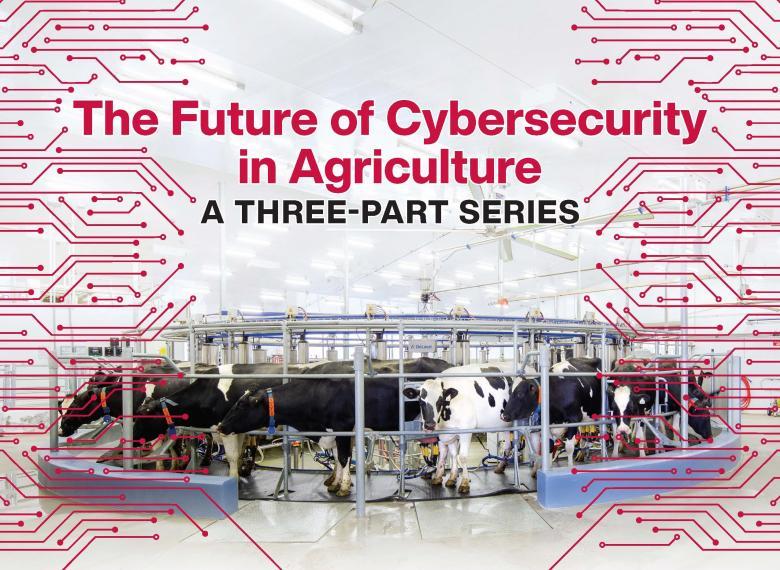As farms increasingly rely on new technology like smart systems that control everything from barn temperature to feeding infrastructure and milking robots, cybercriminals see producers as easy prey. Whether for ransom or activism, cyberattacks can derail businesses and threaten animal health.
Alliance advances cybersecurity in the dairy sector

A slow-burning conversation ignited this spring as researchers, technology companies and agri-food experts came together through multiple events to shape the future of cybersecurity in the agri-food sector.
“It doesn’t matter if you’re a small producer or a multimillion-dollar health care, financial or agricultural operation — if your system is vulnerable, eventually you will be a target,” said Dr. Ali Dehghantanha, Canada Research Chair in Cybersecurity and Threat Intelligence at the University of Guelph and founder of the Cyber Science Lab.
Through a series of cybersecurity-focused events organized by U of G’s Research Innovation Office (RIO) and supported by the Food from Thought Research program and the Ontario Agri-Food Innovation Alliance, Dehghantanha and a team of University of Guelph experts catalyzed connections and sparked new ideas among dairy producers, suppliers and government.
Cyber security impact
- 60 per cent of small- and medium-sized Canadian businesses go bankrupt within six months of cyberattack
-
3 events hosted by U of G raised awareness and facilitation conversation among industry, tech companies, producers, government and academia
- Two-thirds of Canadian businesses have experienced a cyber security incident
Building awareness at Dairy XPO
In early April, a U of G team discussed cybersecurity risks with about 500 producers at the 2024 Canadian Dairy XPO, a global showcase for Canadian dairy producers.

in case they find themselves victims of a cyberattack.
RIO project coordinator Nakita Byrne-Mamahit and Sofiya Makar, a PhD student in the School of Computer Science, spoke with producers and industry representatives. “Many had very little knowledge about cybersecurity threats to their businesses,” said Makar.
“Cybersecurity is not on their radar and so it is not really prioritized.” Awareness was highest among those who had already faced an incident, said Byrne-Mamahit. Dehghantanha offered a free information session about the unique vulnerabilities of the agri-food sector, while other team members distributed take-home tip sheets.
Event metrics:
- 500 producers engaged
- 171 YouTube views of the presentation

What could go wrong? A cybersecurity simulation for industry
The second event brought members a curated group of invitees from of tech companies, equipment dealers, producer groups and government to the Ontario Dairy Research Centre in Elora, Ont. The research centre, which is also a functioning farm, is owned by the Agricultural Research and Innovation Ontario and managed by U of G through the Ontario Agri-Food Innovation Alliance.
Dehghantanha and Lucas Alcantara, manager of research centre data, walked participants through real-life scenarios that could compromise dairy barns, such as an attack at the sorting gate.
“There were a lot of benefits to being included in this event,” said Jeromy Ten Hag, a product specialist from Lactanet, which provides herd management software for farmers and advisers. “This meeting raises awareness that it’s not just big organizations that have to worry about attacks.”
Since the event, Ten Hag said the company has changed its customer service processes to strengthen passwords and secure connections when idle.
Event metrics:
- 23 invitees attended
- 4 contacted Dehghantanha for follow-up

Elevating the conversation to build a resilient food system
The event series concluded with a cybersecurity panel and networking session with thought leaders, innovators and industry professionals discussing cybersecurity capacity and resilience in Canadian agriculture. The event aimed to connect U of G faculty with industry and ultimately improve agricultural cybersecurity.

Research & Corporate Services at the
Ontario Ministry of Agriculture, Food and Agribusiness,
engaged in a panel discussion about
cybersecurity capacity in Canadian agriculture.
Photo credit: Diana Martin
Cox Wensink, a dairy farmer near Innerkip, Ont., attended the event to learn how to make the family-run dairy farm “cyber-safe.”
“We don't have the knowledge to make the farm more secure ourselves,” said Wensink. “The event made me aware how easy it is to hack a farm, and how prevention would involve working with suppliers as well.
“After the session, I immediately changed all our passwords, removed ‘standardized’ passwords and spoke to our suppliers why this change was made. I've also reached out to Professor Dehghantanha to set up a cyber-security analysis of our farm.”
Wensink learned about the need for collaboration and awareness among farms and suppliers. “For farms to be cyber secure, the suppliers also need to be on board. It's a team effort. If a supplier gets hacked, many farms would be at risk,” she said.
Event metrics:
- 77 attendees
- 4 follow-ups on day of event
- 6 RIO follow-ups to discuss partnerships, introductions or working groups
Feedback from events has underscored the importance of discussing cybersecurity to ensure that producers know the risks and how to better protect their farm and business. And, thanks to the long-term collaboration between U of G and the Ontario Ministry of Agriculture, Food and Agribusiness, they know where to find experts to help.
Food from Thought is a research program at the University of Guelph funded in part by a $76.6-million grant from the Canada First Research Excellence Fund. Food from Thought will position Canada as a global leader in the development of innovative solutions that improve both the sustainability and productivity of agricultural production at global, landscape, and micro scales.
The Ontario Agri-Food Innovation Alliance is a collaboration among the Ontario Ministry of Agriculture, Food and Agribusiness, Agricultural Research and Innovation Ontario, and the University of Guelph. The Alliance supports RIO innovation and commercialization activities to amplify sector impact.